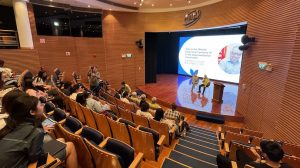Knowledge of how tourists from the Mainland perceive Macao as a travel destination is important because it can have an impact on how the Macao Tourism Industry Development Master Plan should be implemented. That is according to a study involving an IFTM researcher, which looked into user-generated content to evaluate Macao’s destination image as perceived by visitors coming from the Mainland.
The researchers concluded that Mainland Chinese tourists generally considered Macao as ‘a leisure tourism destination with a unique selling point on gambling’. The findings were based on an assessment of user-generated reviews of trips to Macao, published on the popular international travel website TripAdvisor.com and its Chinese version.
The work went on to discuss the links between the perceived image of Macao and the city’s Tourism Industry Development Master Plan. The researchers proposed that the Macao Government Tourism Office (MGTO) make use of user-generated content to assess the tourism potential of various attributes of the city, redirecting resources to those areas that tourists identified as appealing.
The study was produced by IFTM scholar Dr. Qi Shanshan, in partnership with Dr. Ning (Chris) Chen from the University of Canterbury, New Zealand. Their paper, titled “Understanding Macao’s Destination Image through User-generated Content”, was published in the Journal of China Tourism Research.
The study was funded by Macao’s Science and Technology Development Fund.
Cultural potential
As part of their research, Dr. Qi and Dr. Chen collected a total 1,584 reviews on Macao posted by Mainland Chinese tourists on TripAdvisor and its Chinese version.
According to their findings, the repositioning of Macao’s destination image “to being more ‘cultural’ is promising and has an empirical basis”. Such repositioning is one of the strategies featured in the Macao Tourism Industry Development Master Plan, a document published in 2017 by MGTO.
The researchers said that their findings indicated ‘historical sites’ were an important component of Macao’s image. Tourists from the Mainland had the impression Macao had a “mixed Chinese and Portuguese lifestyle, which is unique,” Dr. Qi and Dr. Chen wrote. “These results provide evidence to support the claim that Macao has great potential to develop into a cultural destination,” they said.
The researchers had a different view regarding the emphasis put by the Macao Tourism Industry Development Master Plan concerning the need to provide comprehensive quality services across various areas of the tourism industry. “There are no significant concerns raised on service quality in Macao from Mainland Chinese tourists’ online reviews,” they pointed out. According to the study’s findings, Mainland visitors described the city as clean and easy to navigate, with special praise given to the standard of service at local hotels.
“However, service quality in casinos may require improvement, since the term ‘bad’ was mentioned several times,” Dr. Qi and Dr. Chen acknowledged.
In their discussion of the Macao Tourism Industry Development Master Plan, the researchers noted that the document lacked “depth” in terms of the proposed segmentation of the tourism market and respective targeting strategies. The plan “does not conduct any detailed analysis on understanding the segments of Mainland Chinese tourists or suggest any specific future actions to deal with each segment,” the researchers said.
As part of their study, Dr. Qi and Dr. Chen highlighted the role of user-generated content as an information source regarding tourist perceptions of Macao as a destination. In relation to Macao, the researchers added, heritage sites, and shows and entertainment were “clearly 2 major themes” in which visitors from the Mainland showed interest.
The 2 scholars said: “For the heritage attractions, the comments still centre on the major or so-called famous heritage sites in Macao.” To develop further Macao’s tourism industry, “MGTO needs more effort on promoting its various heritage attractions to separate the focus from its major sites”.
The Macao Tourism Industry Development Master Plan was designed to position Macao as a world centre of tourism and leisure, mapping out an overall plan for tourism industry development. According to MGTO, the plan is currently being reviewed, in response to changes in the tourist market and the development of the tourism industry.
More info
Dr. Ning (Chris) Chen is a Senior Lecturer in Marketing at the University of Canterbury, New Zealand. He has a PhD from the University of New South Wales, in Australia. His research interests cover place attachment, resident/tourist psychology and behaviour, and destination branding.
https://doi.org/10.1080/19388160.2019.1577199









